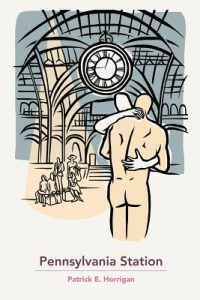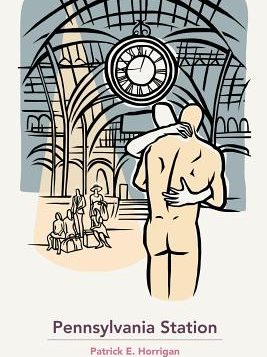 Pennsylvania Station
Pennsylvania Station
by Patrick E. Horrigan
Lethe Press. 217 pages, $15.
THIS NOVEL offers a powerful glimpse into gay life in America before Stonewall, and a look at the complicated relationship between two very different men. Beginning in 1962, the book tells the story of Frederick Bailey, a nearly middle-aged, closeted architect, who meets and falls in love with Curt, a much younger man who lives more openly and recklessly. Their relationship is a tumultuous one and the cause of much conflict for Frederick. In the meantime, the latter gets dragged into the protests against the gradual demolition of the old Pennsylvania Station, which is about to be replaced by Madison Square Garden. The novel depicts a nation on the verge of social and cultural, as well as architectural, change.
The novel is full of historical details, both the cultural highlights as well as the general mindset about homosexuality held by and about gay men. The very first line states that Frederick “had to be careful not to seem ‘too musical,’” while seeing a production of My Fair Lady. He compares Margot Moser unfavorably to Julie Andrews in the role of Eliza, finding that Andrews “had a strength, a self-possession … that, combined with the rich beauty of her voice, … produced for Frederick something magical.” Frederick travels with Curt and other friends to D.C. to attend the 1963 March on Washington, listening to singers like Joan Baez before hearing Martin Luther King, Jr.’s speech. While Curt squeezes Frederick’s hand in affirmation of everything said, Frederick, who “didn’t believe in causes,” makes a personal pledge of commitment to Curt. They attend a meeting of the New York Mattachine Society, where the guest speaker is a psychoanalyst who argues that “homosexuality is an emotional disturbance.” Curt and a few others vocally protest this view, arguing that the society should “move away from the respectability of debate and into the arena of social activism,” prompting Frederick to think: “Picketing—protesting—advocating on behalf of one’s homosexual tendencies in public? That was unthinkable.”
The book also captures the difficulties between Frederick and Curt. Every discussion they have seems on the verge of an argument. Curt is beaten up by the police and arrested at a beach for going to the refreshment stand without wearing a towel over his bathing suit. When he tells this story to Frederick, the older man informs him of the impossibility of challenging the rules like that. Curt frequently shows up at Frederick’s apartment at unpredictable times, until finally Frederick gives him a set of keys. Their trip to Italy is fraught with tension, with Frederick trying to set the agenda and complaining about Curt wanting to film everything with his new movie camera, while Curt restlessly asserts his independence, walking the cities late at night. At the start, Frederick’s gay friend Sam urges caution, reminding him of Curt’s arrest at the beach: “You really want to get mixed up with a kid who flirts with danger like that?” All signs point to this relationship not ending well.
And yet, the two have tender moments. Frederick reads to Curt from Walt Whitman’s Calamus poems celebrating same-sex love; Curt later quotes a line from one of them to Frederick during a casual conversation. On the train to D.C., Curt rests his head on Frederick’s shoulder while sleeping, and to Frederick “the pieta seemed right, not queer.” Curt accompanies Frederick to Reading, PA, to visit Frederick’s family, and the young man gets along well with the relatives, talking with Frederick’s mother, who is battling dementia. Watching these two men love and fight each other is incredibly moving. Pennsylvania Station perfectly reflects the complexities of history and relationships.
________________________________________________________
Charles Green is a writer based in Annapolis, Maryland.






